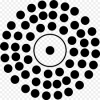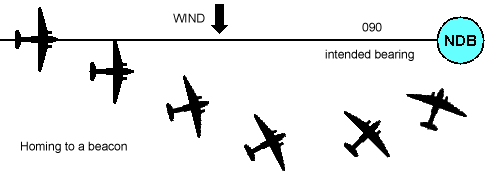ADF
Automatic Direction Finder (ADF)
Non-Directional Beacon (NDB)
The Non-Directional Beacon (NDB) is a simple radio transmitter designed to produce a stable radio wave which follows the curvature of the earth's surface (a ground wave). The wave is transmitted with equal strength in all directions. It is call a non-directional signal.
NDB's operate in the low to medium frequency bands at around 200 to 400 KHz.
The airborne component which receives this ground wave is called Automatic Direction Finding (ADF) equipment. Because the ground wave follows the earth's surface, the range of the equipment is not limited to line of sight, but varies with the power of the transmitter and the nature of the surface.
The reliability of the signal can also be affected by thunderstorm effect (emitting low to medium frequency signals), mountain effect (reflections of the signal) sky wave (reflection of signals from the ionosphere) and coastal refraction (bending of the signal as it crosses the coast and speed changes of the signal as it passes over different surfaces - land to water).
Ground wave signal
ADF instruments
Original ADF instruments were normally 'Fixed card ADFs' , as the name implies this card does not turn when the aircrafts heading changes, but remains fixed, with 0 always representing the nose and 180 always representing the tail, (& 090 always the right wing and 270 always the left).
These instruments are rarely found these days as most aircraft (including all the modules found in DCS) have, at minimum a Radio Magnetic Indicator. see RMI
Wind Drift
One element to consider when using an NDB to navigate, the ADF indicator will always point at the station regardless of the aircrafts heading or track across the ground
Struts Tutorial on how to use ARK-9 ADF in Mi-8
https://www.slideshare.net/Strut1/mi8mtv-arc9-adf-how-to-use-it-37168975?next_slideshow=2
back to Instruments
back to Navigation


